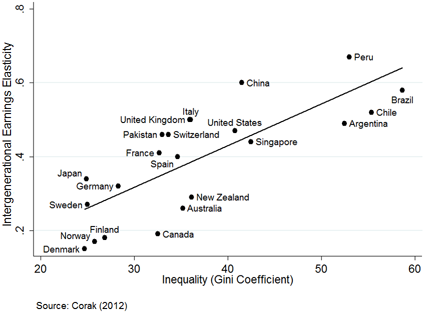February 21, 2012
In an otherwise very good New York Times Sunday Review piece, Sandra Aamodt and Sam Wang argue that: “French children also are tracked into different academic paths by age 12, a practice that reinforces the influence of parental socioeconomic status on educational and career outcomes, reducing social mobility.” Whether or not their point about tracking is correct, the implication here that children in France have less social mobility than those in the United States is not.
As the figure below—from researcher Miles Corak—shows, France actually has more intergenerational mobility than the United States.

“Intergenerational elasticity in earnings”—the y axis on the chart—is the mobility statistic. It shows the percentage difference in earnings in the child’s generation associated with the percentage difference in the parental generation. So, in the United States, an intergenerational elasticity in earnings of roughly .5 tells us that if one father makes 100% more than another then the son of the high-income father will, as an adult, earn 50% more than the son of the relatively lower-income father. France’s elasticity of roughly .4 shows that a 100% difference between the fathers would only lead to a 40% difference between the sons.
In short, France has more mobility. While it still may be the case that there would be even more mobility in France if it weren’t for the presence of distinct vocational and academic tracks at the secondary level (and less mobilty in the United States if we adopted this approach), I don’t know that the evidence is clear on this front. Some research suggests, for example, that vocational tracks may increase mobility by “reducing the likelihood of unemployment and of employment in the least desirable of jobs.”






